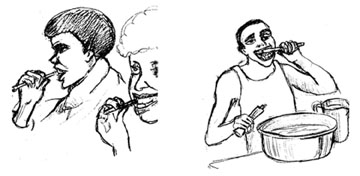Oral hygiene (oral care)
The mouth is the area of the body most prone to collecting harmful bacteria and generating infections. Our mouth mechanically breaks food into pieces. This process leaves food particles (food debris) that stick to the surface of our gums and teeth. Our mouth cavity is full of bacteria and is a good environment for bacterial growth.
Why is the mouth a good environment for bacterial growth?
It is at the optimum temperature (37ºC) and is often rich in food particles that support bacterial growth.
The decaying process that takes place on the surface of the teeth eventually produces a build-up called plaque (a sticky deposit on which bacteria grow) that is then converted into tartar (a hard, yellowish, calcified deposit on the teeth, consisting of organic secretions and food particles). The result is tooth decay. In addition, unpleasant smelling breath (halitosis or stinking odour), teeth and gum infections could be a result of poor oral hygiene.
Advice for keeping the mouth clean (Figure 3.3) is:

- Rinse the mouth after each meal.
- Brush your teeth with a fluoride-containing toothpaste twice a day – before breakfast and before you go to bed. Cleaning the mouth with twigs is possible if done carefully.
- During the day, fill your mouth with water and swish it around to get rid of anything sticking to your teeth.
- In addition to regular brushing, it is advisable to floss your teeth at least once a day, usually before you go to bed.